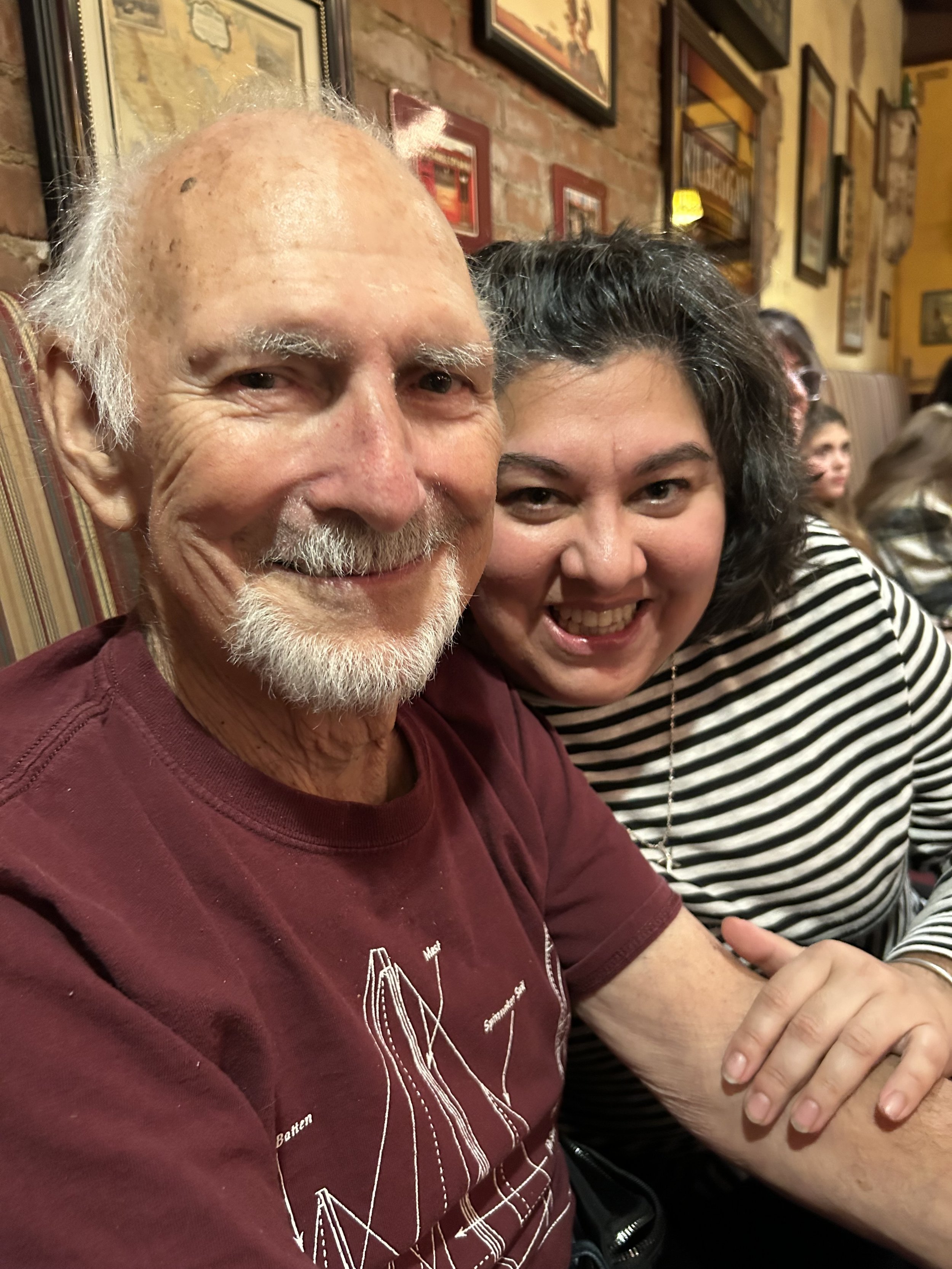We lost dad on November 17, 2023 but his fight against cancer started in October 2021. Having a parent battling cancer has been emotional for all of us the siblings and loved ones surrounding us. I started feeling sadness from the beginning, the first day we got the diagnosis. While dad refused to believe the diagnosis and the prognosis until the very last days, I knew in my gut it was the beginning of the end in October 2021.
I am so grateful that just a few months prior to that diagnosis of stage 4 cancer, I had moved from Ottawa to be close to family. How my angels worked their magic so that I was already around the family. I could spend time with dad and be with family instead of living this experience in Ottawa alone.
Since the diagnosis in October 2021, I made a promise to myself to shift some of my priorities. I focus on spending more quality time with both my parents. It wasn’t always easy since I also have a full-time job and other commitments but after my dad passed, I didn’t have any regrets. I appreciated all the memories created together while also respect my boundaries and my personal needs.
I concentrated on prioritizing my health and well-being even more. Regularly, pondering my sources of joy and happiness: what did I need to do for myself, what did I need to stay healthy, to stay strong, to stay sane and positive. Instead of writing, I prioritized living, feeling and being in the moment. I spent time with likeminded people helped me for the inevitable passing of my dad.
Now, a few months after dad’s passing, as I move through my grief, as I journal and reflect on losing a parent to a prolonged battle with cancer, I acknowledge that it can take a toll on one's mental health. Even people without previous mental illnesses or fragilities.
The journey of grief in itself is a rollercoaster of emotions, and understanding the signs of emotional exhaustion is crucial for maintaining overall well-being. As I’m navigating my grief, I’ve done some reading and research and I’ve come up with some things that I’d like to share with you. Are you also going through the same thing? Are you losing a parent to an illness? Have you lost a parent recently?
I’ll describe below the emotional exhaustion I’ve been feeling, the physical impact on my body. I’ll list a few signs to watch out for and some self-care strategies that I found have helped me protect my mental health and well-being for the last 2 years as we accompany dad through his last days.
This blog includes:
Emotional Exhaustion:
a.Persistent Sadness and Grief:
Enduring the prolonged struggle of a parent's illness can lead to continuous or waves of sadness and grief. I noticed this state started when dad was first diagnosed with terminal cancer until he passed 2 years later. And of course, still now as it’s only been 3 months since his passing, I have unexplained moments of wanting to cry, yell, be unhappy and then an overwhelming feeling of sorrow.
b. Feelings of Helplessness:
Witnessing a loved one fight a relentless battle can create a sense of helplessness, contributing to emotional exhaustion. Being an empath and very highly sensitive individual, it was extremely hard to see dad struggle and fight against cancer while there was nothing I could do. Like I mentioned, dad didn’t want to accept or believe his prognosis, I felt even more powerless and useless in this situation.
c. Anxiety and Anticipatory Grief:
Constantly anticipating the inevitable loss can trigger anxiety, compounding the emotional burden. The anxiety was well hidden but it was present. Every time I would visit with dad, I would wonder if it was the last time I would see him. Every time I would hang out, I was wondering if he was going to get sicker and start forgetting who we were. I wondered how bad it would get, I wondered how much he would suffer and be in pain before he left this world. I used to suffer from panic attacks and had high functioning anxiety, this constant waiting game was not good for my anxiety and it added an emotional burden I didn’t even realized was there until I started reading and talking about it.
2. Physical Impact:
a. Sleep Disturbances:
Stress and emotional turmoil may lead to sleep disturbances, impacting overall physical health. Since my constant and regular sleep pattern is crucial for my overall health, I always ensure that my sleep was not overly affected but I did see this impact on my other family members.
b. Changes in Appetite:
Grieving often disrupts regular eating patterns, leading to either overeating or loss of appetite. The last month of his life, I lost my appetite but I also lost the motivation and desire to cook for myself. I needed to force feed myself. The last few weeks before his passing and then a month after, I really didn’t have a good regular eating pattern. It started to affect my mood. I was eating what I could find, what was easy and convenient. I also did some emotional eating. I gained weight. My whole system was impacted by my unregulated and unhealthy eating habits I had picked up.
c. Weakened Immune System:
The prolonged stress of caregiving and grief may compromise the immune system, making one susceptible to illnesses. As soon as we had dad’s celebration of life which was one week after the passing, my 3 siblings got sick. Their bodies were definitely telling them to take time to rest and recuperate. I booked a trip to a sunny destination so I could rest. I also boosted my immune system by taking electrolytes and additional vitamins.
3. Signs to Watch Out For:
a. Isolation:
Withdrawing from friends and family is a red flag for emotional exhaustion.
b. Fatigue:
Constant tiredness that persists despite adequate rest may indicate both mental and physical exhaustion.
c. Difficulty Concentrating:
Grief can affect cognitive function, making it challenging to focus on tasks or make decisions.
Strategies to protecting your well-being
4. Self-Care Strategies:
a. Seek Support:
Share your feelings with friends, family, or a professional therapist to avoid bottling up emotions. I’ve been scheduling more frequent regularly meetings with my therapist to really verbalize my emotions. I have also leaned more heavily on my circle of close friends. Instead of being the rock, I allowed myself to be more vulnerable and verbalize my need for my friends’ support. They have been my rock as I’ve been living through my ebb and flow of emotions.
b. Prioritize Sleep:
Establish a healthy sleep routine to promote physical and mental recovery. Like I mentioned before, sleep is always so important. Even more when we are emotionally drained. Listen to your body, I’ve needed afternoon naps, going to bed earlier or staying in bed later in the morning. I’ve realized that sleep is so good for my overall mental and physical health.
c. Healthy Coping Mechanisms:
Engage in activities that bring comfort and joy, such as hobbies or spending time with loved ones. Do like I do… ask yourself daily: what do you need? What brings you joy? What can you do that will bring you comfort? If you can be planning too much in the future, take a day at a time. Sometimes just a moment at a time.
I’ve enjoyed occupying my time by spending time with my family, my loving nieces, doing fun activities with them. Also, focusing on my hobbies. I love doing a puzzle and listening to a good entertaining podcast or audible book. I also find peace and joy in the kitchen: meal prepping for the week. Making a good healthy recipe.
I am not someone that regular journal. However, a family friend recommended the book: How to carry what can’t be fixed : A journal for grief by Megan Devine. Its been a real eye-opener. I’m really learning a lot of my grieving process. It’s been so good for me to express my feelings.
d. Set Boundaries:
Acknowledge your limits and learn to say no to additional responsibilities when needed. Saying not just to extra responsibilities but also extra commitments that you can’t or don’t want to do right now. And remember that No is a sentence. You should never need to justify. Be clear what you need and then verbalize your needs. I’ve noticed that for a while, I could only really focus on work and rest. I didn’t have energy or bandwidth for much more. I respected where I was and I set boundaries accordingly. Everyone is different and everyone needs different things.
e. Professional Help:
Don't hesitate to seek therapy or counselling to navigate complex emotions and grief. If you do not have a regular therapist that you consult, I invite you to find someone to talk about your feelings and what is going on. It’s true that the grieving process is really like a roller coaster of emotions. There are some really good days, some really sad days and some just normal average days. It’s so important to be able to welcome all of the emotions: the good, the bad and the ugly!
5. Protecting Your Well-being:
a. Establish Rituals of Remembrance:
Create meaningful rituals to honor your parent's memory and process your grief.
b. Maintain Healthy Habits:
Regular exercise, a balanced diet, and adequate sleep contribute to overall well-being during difficult times.
c. Connect with Others:
Share memories and stories with friends and family to foster a sense of connection and support.
Remember, grief is a unique journey, and it's crucial to prioritize self-care while navigating the complexities of losing a parent or a loved one, no matter the cause of death.
By recognizing signs of emotional exhaustion and implementing healthy coping strategies, you can protect your mental and physical well-being during this challenging time.
Moving through my grief
Though the journey through grief after losing a parent may feel overwhelming, remember that each step forward is a testament to your strength and resilience.
Cherish the memories, find solace in the love shared, and know that healing is a gradual process. In time, may the pain soften, replaced by fond memories and a deepened appreciation for the life they lived.





